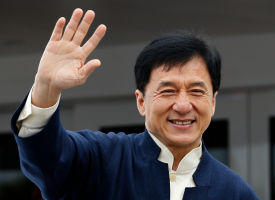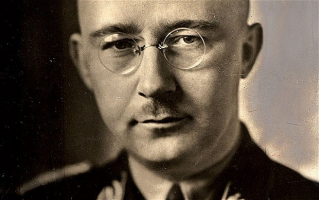Top 6 Interesting Facts about Jackie Robinson
At the start of the mid-20th century, Jackie Robinson was a baseball icon. Most famously, he played in Major League Baseball as the first African American. ... read more...Robinson received the Rookie of the Year Award in his debut MLB season. Explore more with Toplits' Interesting Facts about Jackie Robinson!
-
Robinson was drafted into the Army shortly after the attack of Pearl Harbor and was given a cavalry company at Fort Riley, Kansas. During World War II, Robinson and Louis both served in the Army.
He made a personal bond with fellow recruit and champion boxer Joe "the Brown Bomber" Louis during basic training. Louis had notably defeated the German Max Schmeling in a contentious match in 1938. American professional boxer Joseph Louis Barrow competed from 1934 until 1951. Louis, often known by his ring name "the Brown Bomber," is recognized as one of the best and most influential fighters in history. From 1937 until his brief retirement in 1949, he held the title of heavyweight world champion. He won 25 straight championship defenses, which is a record across all weight divisions. The longest single reign as champion in boxing history belongs to Louis.
Louis utilized his status to help Jackie and several other black soldiers get entry to the Army's Officer Candidate School after they had been wrongfully denied admission due to their color. Louis and Robinson frequently played golf together in their spare time.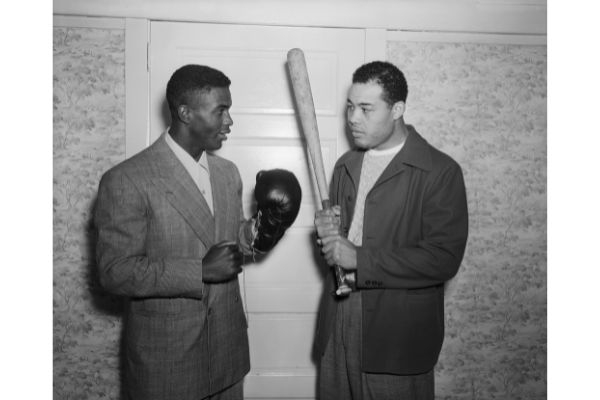
Photo: andscape.com 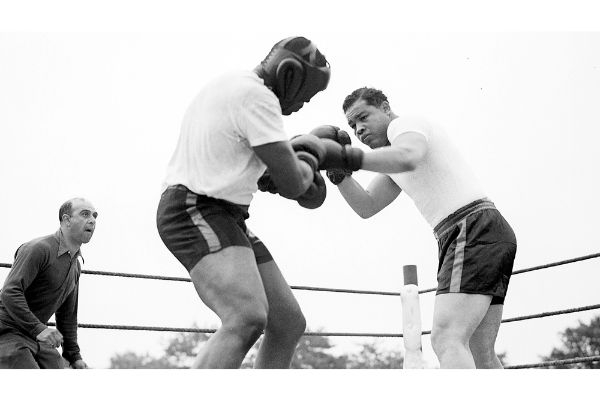
Photo: andscape.com -
The House Un-American Activities Committee, a Congressional panel that investigated the actions of alleged communist sympathizers and subversives, suddenly summoned Robinson to testify before them in the summer of 1949. The request was made in response to a scandal involving the black musician and actor Paul Robeson, who had said that given how poorly African Americans had been treated in the United States, they were unlikely to support the war against the Soviet Union. Robinson gave a sophisticated statement criticizing communism and the sins of racism in response to a question about black allegiance to the American way of life. Robeson, whom he loved for his civil rights activism, had made "silly" remarks about black patriotism, he also kindly noted. The speech was well-received, but Robinson afterward expressed regret for becoming mixed up in the witch hunts being conducted by the Committee.
Jackie would change his mind regarding his evidence before HUAC toward the end of his life. "I have become wiser and closer to harsh truths about America's destructiveness," he said of one of several political decisions he later second-guessed. And I do have more respect for Paul Robeson now because I think he was genuinely trying to help his people over the course of those 20 years by sacrificing himself, his profession, and the wealth and comfort he formerly enjoyed. This is one of the most interesting facts about Jackie Robinson.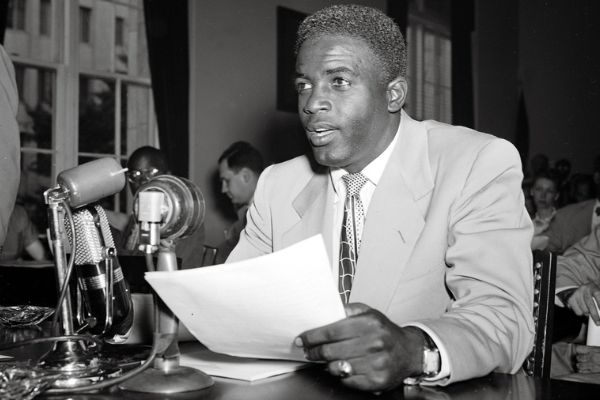
Photo: andscape.com 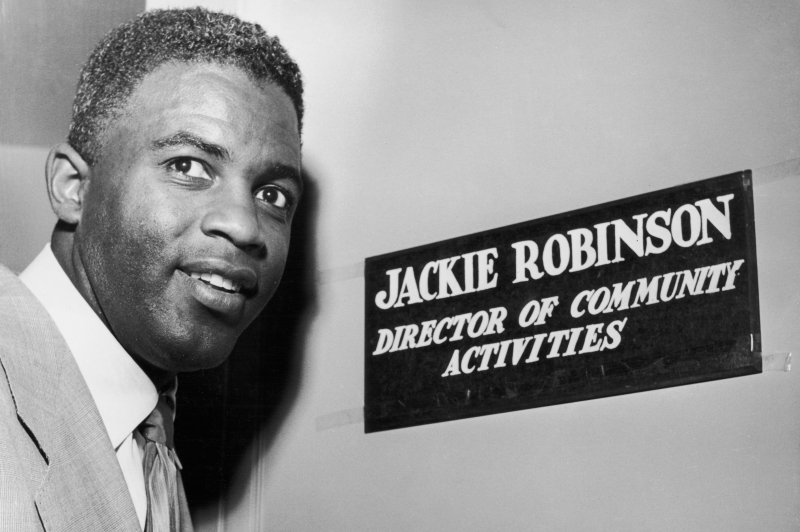
Photo: bleacherreport.com -
When Robinson played himself in the 1950 Hollywood film "The Jackie Robinson Story", he became one of the first black leading males on the big screen which is also one of the most interesting facts about Jackie Robinson. The Jackie Robinson Story is a 1950 biographical movie starring Jackie Robinson that was directed by Alfred E. Green (who had also directed The Jolson Story, "one of the biggest hits of the 40s").
Robinson is a boy as the movie opens. A stranger, pleased by his fielding abilities, gives him a battered baseball glove. He excels in multiple sports as a young man while attending UCLA, but as graduation approaches, he starts to worry about his future. Mack, his older brother, also graduated from college and was a good athlete, but the only work he could get was as a menial street cleaner. The movie centers on Robinson's battle against bigots' abuse as he becomes the first black player in Major League Baseball in the modern age.
The movie is included in the United States' list of public domain movies. But in 2008, the Jackie Robinson Foundation and a new copyrighted "restored and in color" version published it.
Despite having a little budget, the movie did well at the box office, and Robinson's performance was well-received. Jackie Robinson was a superb athlete who also had some natural acting talent. He had a cameo appearance in the biographical film The Jackie Robinson Story in 1950 playing himself. Notably, Ruby Dee, an Oscar candidate, portrayed his wife Rachel Isum Robinson.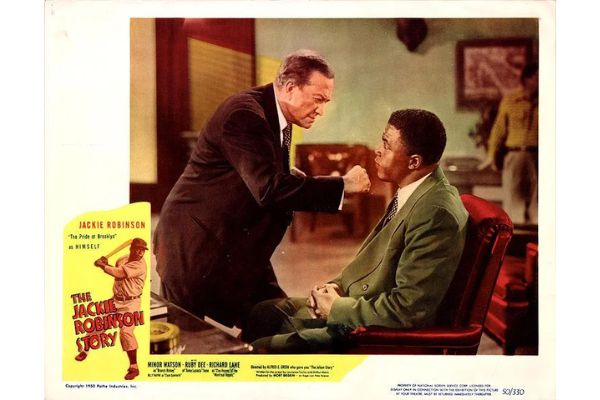
Photo: slate.com 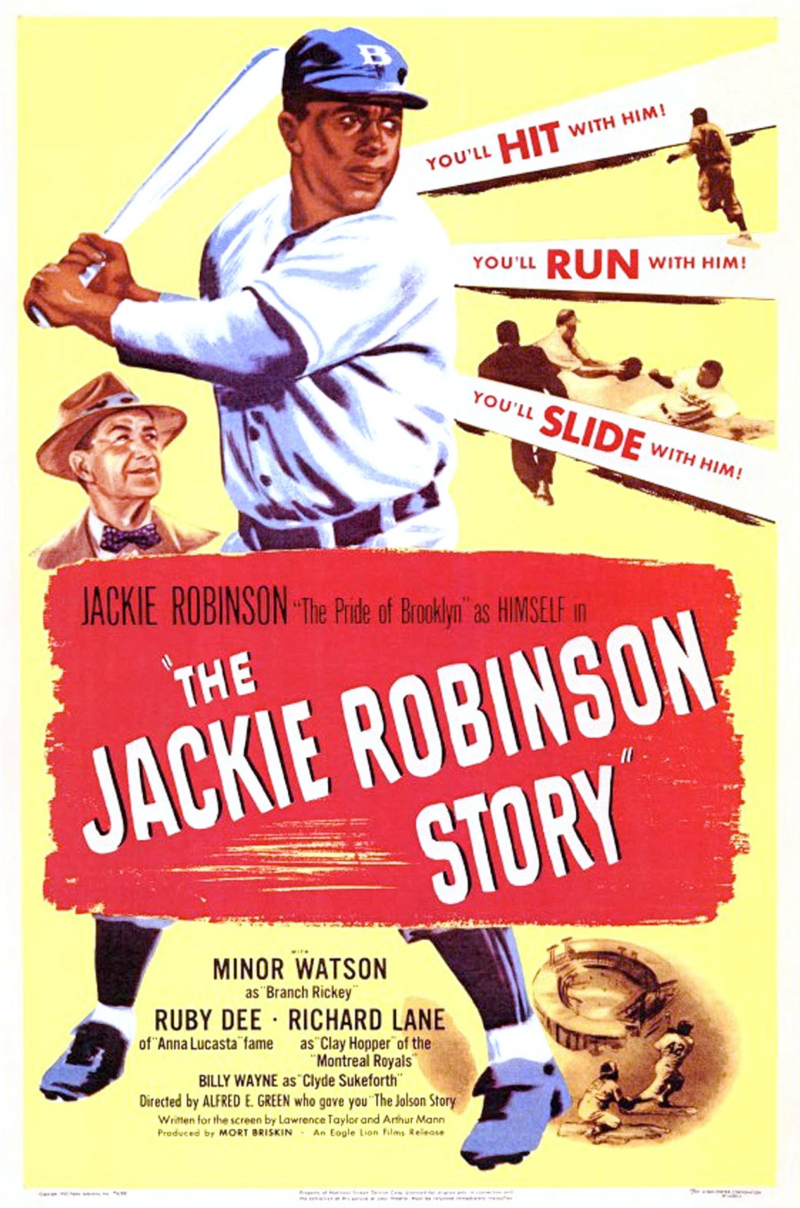
Photo: www.imdb.com -
Senator Richard Nixon of California, the Republican candidate for vice president, congratulates Jackie Robinson on the Brooklyn Dodgers' 6-5 victory against the Yankees here in the locker room at Yankee Stadium following Game 5 of the 1952 World Series. (The Dodgers eventually suffered a seven-game defeat.) Robinson supported Richard Nixon for president in 1960, calling John F. Kennedy's Democratic opponent's dedication to civil rights "insincere." An African-American Republican was by no means exceptional in those days. The reelection of President Dwight Eisenhower and his vice president received support from about 39% of black voters.
Robinson dedicated his time to the civil rights struggle and took an active role in politics after quitting baseball in 1957. He astonished many of his peers during the 1960 presidential campaign when he traveled the nation making stump speeches for then-Vice President Richard Nixon, whom he claimed had more appealing views on civil rights than John F. Kennedy. Robinson had personally visited Kennedy in July 1960, but the Massachusetts senator departed the meeting with the impression that he was disengaged from the situation of African Americans. Robinson finally changed his mind in the early 1960s and later spoke of his appreciation for both President Kennedy and his brother Robert F. Kennedy after the two engaged in a brief verbal battle in the media.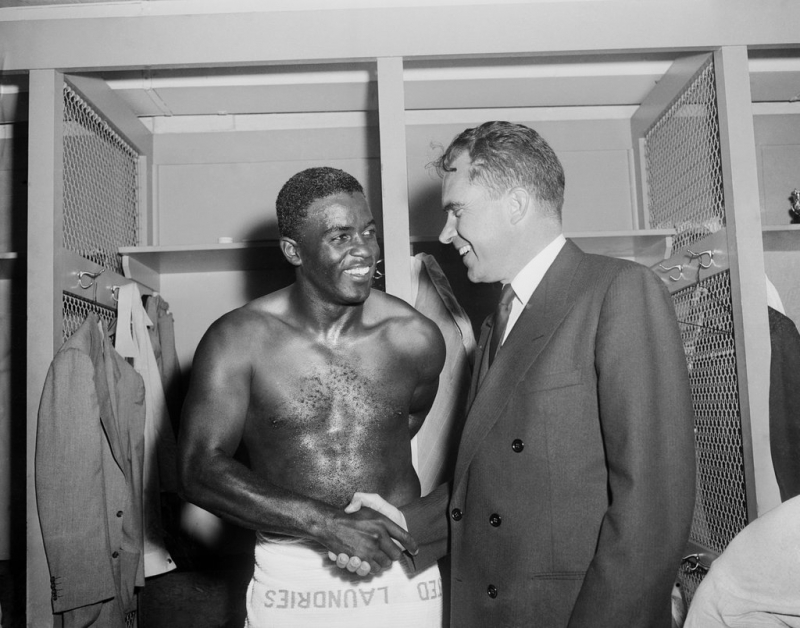
Photo: www.nytimes.com 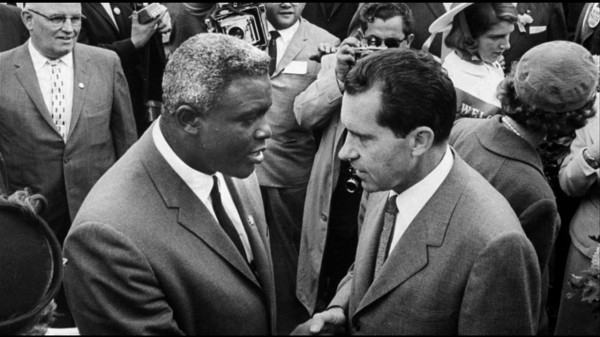
Photo: potus-geeks.livejournal.com -
Robinson was drafted in 1942 and deployed to a segregated Army cavalry unit in Fort Riley, Kansas, during World War II. In January 1943, he received his appointment as a second lieutenant. The 761st "Black Panthers" tank battalion was Robinson's next stop after being sent to Fort Hood, Texas.
He boarded an Army bus on July 6, 1944. Robinson was asked to relocate to the back of the car, but he refused. Robinson was arrested after the driver dialed the military police. He was later court-martialed but was found not guilty.
He was relocated to Camp Breckinridge, Kentucky, following his conviction and worked as an Army athletics coach there until his honorable release in November 1944.
Robinson started playing baseball in 1945 for the Kansas City Monarchs of Missouri, a team in the Negro leagues. Branch Rickey, the Brooklyn Dodgers' club president and general manager, started scouting the leagues for talent around that time. Robinson was chosen by Rickey from a group of talented Black athletes, and he was then given an interview for a potential position with Brooklyn's International League feeder team, the Montreal Royals.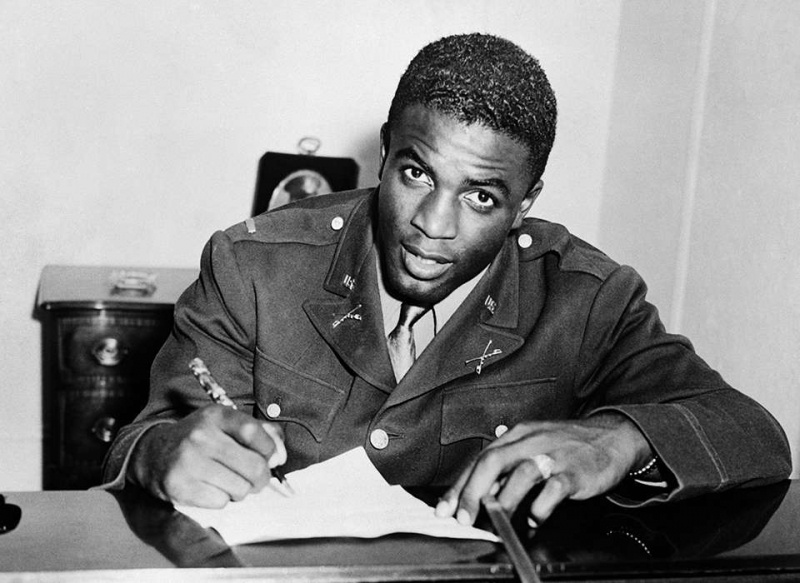
Photo:www.nationalww2museum.org 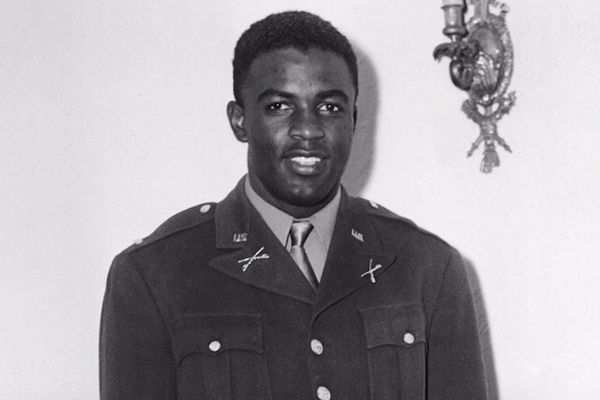
Photo: blog.theveteranssite.greatergood.com -
For control of what the right-wing referred to as "the white man's party" in 1964, Arizona's U.S. Sen. Barry Goldwater competed against Rockefeller and other more liberal Republicans. He was nominated for president by the party which is one of the most interesting facts about Jackie Robinson.
Despite being politically independent, Robinson had strong conservative opinions toward the Vietnam War. Robinson backed Richard Nixon over John F. Kennedy in the 1960 presidential race, despite the fact that Robinson later came to respect Kennedy's position on racial rights. Later, after being disappointed with Republicans for opposing the Civil Rights Act of 1964, he switched party affiliation to become a Democrat.
Despite the fact that Goldwater narrowly lost the presidency to Lyndon Baines Johnson, a Democrat, he was able to win over pro-segregation Democrats, mostly Southern politicians, and their supporters who had left the Democratic Party after it supported legislation in the late 1950s and early 1960s to advance Black civil rights and voting rights.
Robinson had had it with the GOP by 1968. When Nixon again ran for president in 1968, he declined to lend his support. He also got increasingly involved in the civil rights struggle and frequently appeared alongside King.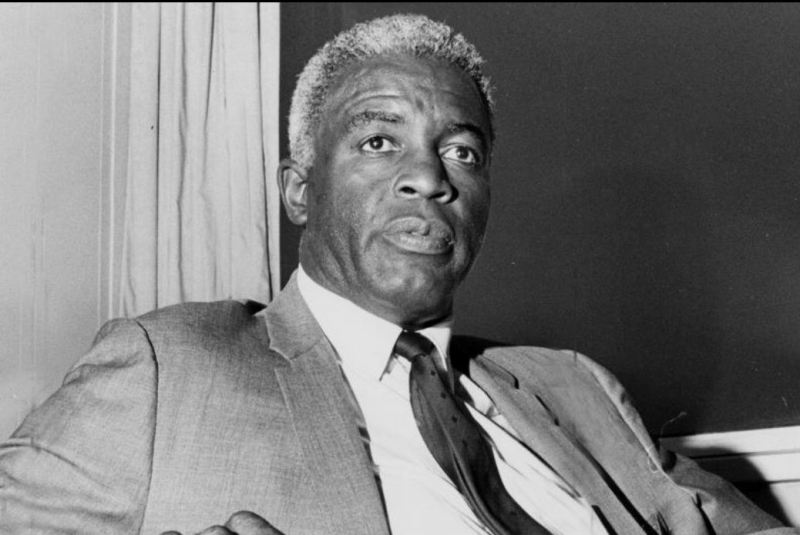
Photo: Twitter 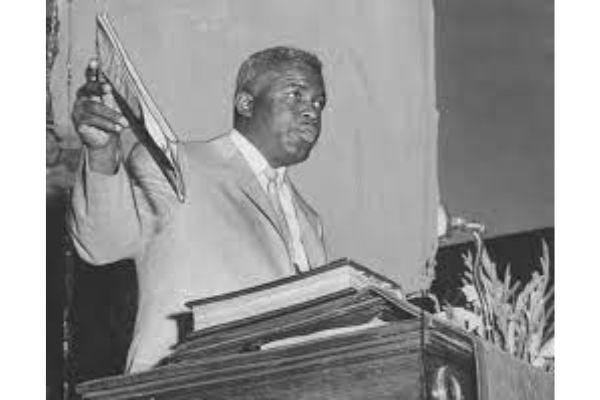
Photo: time.com








